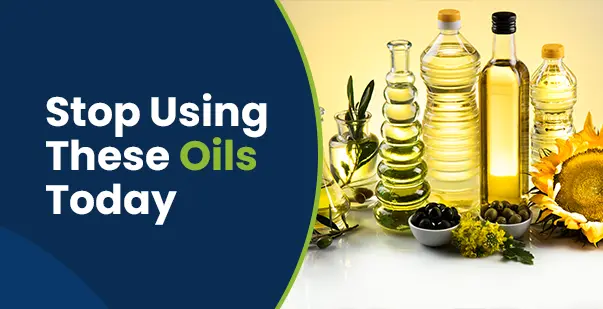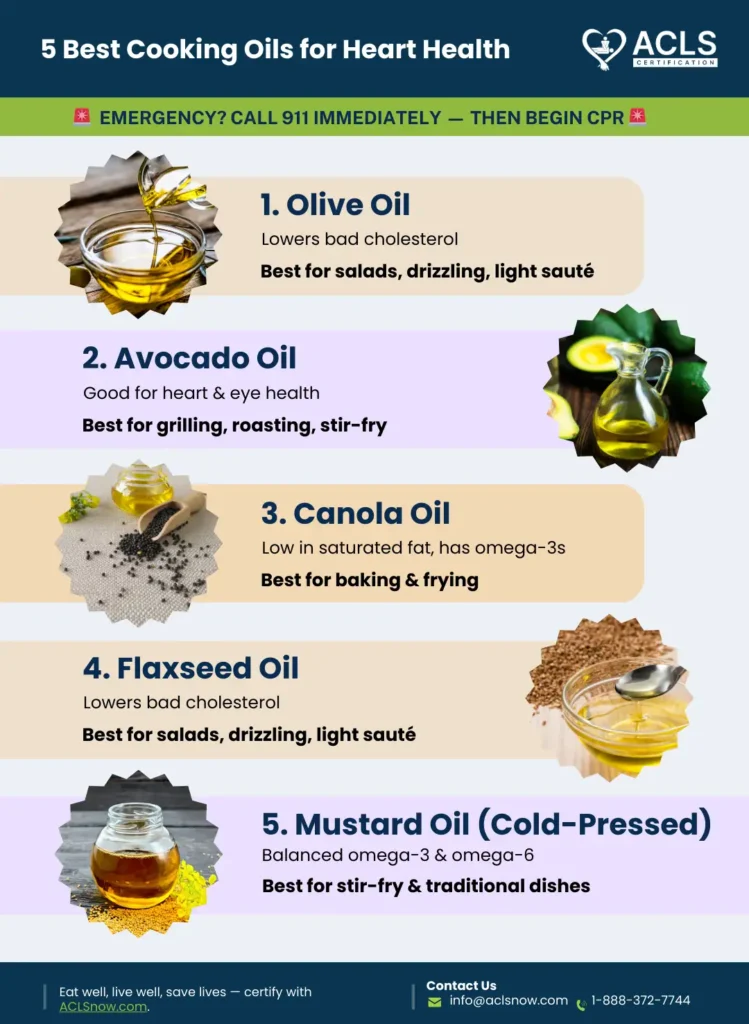When you go to buy the cooking oil at your local supermarket, you will find dozens of options like olive oil, sunflower oil, canola oil, avocado oil, or mustard oil. You are aware that heart disease is the leading cause of death globally. Naturally, you want to make the right choice for your family. But the question remains: Which is the best cooking oil for heart health?
The World Health Organization reports that cardiovascular diseases claim an estimated 17.9 million lives each year worldwide. The shocking part is that the fats we consume are one of the key factors that influence heart health. So, let’s learn everything about the best and worst cooking oils for your heart, and the role of beneficial fats to make smarter cooking decisions.
Master ACLS Now
Get ACLS certified with confidence
Why is Choosing the Right Oil Important for Cardiovascular Health?
Diets high in saturated and trans fats can increase LDL (low-density lipoprotein) cholesterol levels, while unsaturated fats, found in heart-healthy oils, can help reduce this risk. Therefore, it’s essential to choose the right type of oil to ensure your heart gets the healthy fats it needs. Let’s understand the reasons in detail:
Good and Bad Cholesterol Levels
Saturated fat-rich oils, such as butter or palm oil, can increase LDL (bad) cholesterol, which raises the risk of heart palpitations, stroke, and other conditions.
Conversely, oils high in unsaturated fats, such as sunflower, mustard, canola, and olive oils, help increase HDL (high-density lipoprotein) cholesterol and decrease LDL.
Improved Health Conditions
The good fats present in certain oils help blood flow smoothly and lessen blood vessel inflammation. Omega-3 fatty acids, which may lower blood pressure and prevent blood clots, are also present in some oils, such as flaxseed or soybean oil.
Heart-Friendly Oils
Overheating oils during cooking can break down their beneficial compounds and lead to the formation of harmful substances like free radicals and trans fats. So, it is not just the type of oil that matters, but also how a healthy edible oil for the heart is used.
Read More: Cardiac Massage – An Overview and Techniques
What Are the Best Cooking Oils To Support Your Heart Health?
5 Best Cooking Oils for Heart Health
Olive Oil
- Rich in antioxidants & healthy fats for lowering bad cholesterol
👉 Best for salads, drizzling, light sauté
Avocado Oil
- High in monounsaturated fats, good for heart + eye health
👉 Best for grilling, roasting, stir-fry
Canola Oil
- Low in saturated fat, has omega-3s
👉 Best for baking & frying
🌱 Flaxseed Oil
- Plant-based omega-3 powerhouse, for uncontrolled blood pressure & cholesterol
👉 Best for smoothies, salads, drizzle
🌾 Mustard Oil (Cold-Pressed)
- Balanced omega-3 & omega-6
👉 Best for stir-fry & traditional dishes
Eat well, live well, save lives — certify with ACLSnow.com.
Not all ingredients are created equal, which may make it difficult for you to search for the best cooking oil for heart and diabetes. Some are rich in unsaturated fats and antioxidants that help lower bad cholesterol and support vascular health. Let’s explore the oils that are widely considered the healthiest options for cooking:
Extra Virgin Olive Oil
Extra virgin olive oil is considered one of the healthiest cooking oils for the heart. It is rich in monounsaturated fats and antioxidants like polyphenols, which help reduce inflammation and protect blood vessels. Regular use of olive oil has been shown to lower bad cholesterol, which contributes to artery blockages. It may help maintain or slightly raise good cholesterol, which supports the removal of excess cholesterol from the blood.
Best use: Ideal for raw or lightly heated, such as in salad dressings, sautéing on low to medium heat, or drizzling over cooked dishes. Avoid overheating, which can degrade its beneficial compounds, so gentle use preserves its heart-protective benefits.
Avocado Oil
Avocado oil has a very rich nutrient profile and is extracted from the pulp of avocados. The oil is comparatively high in monounsaturated fats, which support lower cholesterol levels and reduce the risk of heart disease.
Best use: Thanks to its high smoke point (271°C), avocado oil is excellent for grilling, roasting, and high-heat stir-frying. This heart-healthy cooking oil also contains lutein, a nutrient that supports eye health.
Canola Oil
Canola oil can support a heart-friendly diet only when consumed in moderation and sourced responsibly. This is among the best oils for heart health and contains low saturated fat and a decent amount of omega-3 fatty acids (9-11%). These elements are responsible for reducing inflammation and protecting your heart.
Best use: This oil works well for baking and frying due to its neutral taste. However, you must choose organic or cold-pressed versions of this heart-friendly cooking oil to avoid highly refined options that may lose nutritional value.
Flaxseed Oil
Flaxseed oil is not meant for cooking, but shines as a supplement to your diet in raw form. It is one of the richest plant-based sources of omega-3 fatty acids. It supports healthy blood pressure and cholesterol levels through its alpha-linolenic acid (ALA) content.
Best use: Mix into your smoothies, salad dressings, or drizzle it over already-cooked dishes. However, do not forget to store it in the refrigerator to maintain freshness.
Mustard Oil (Cold-Pressed)
Mustard oil has a balanced fat profile and strong antibacterial properties. You must always go for cold-pressed mustard oil, which contains omega-3 and omega-6 fatty acids in a ratio (2:5) that supports cardiovascular function.
Best use: deal for stir-frying and traditional cooking techniques. Make sure to use only food-grade mustard oil labeled for culinary use because some of its industrial variants are not safe for consumption.
Read More: Troponin Levels – The Heart Attack Blood Test
How Do Good Fats Impact Heart Health?
Fats are not all bad. In fact, your body needs good fats to support cell function, hormone production, and vitamin absorption. Knowing the difference between good and bad fats is important to make smarter choices when choosing the healthiest oil for the heart. You can choose unsaturated fats from plant-based oils to nourish your heart and maintain vascular health. Here’s a breakdown:
| Type of Fat | Effect on Heart | Common Sources |
| Monounsaturated Fats | Lowers LDL, may raise HDL | Olive oil, avocado oil, almonds, peanuts |
| Polyunsaturated Fats | Lowers overall cholesterol, especially LDL | Flaxseed oil, sunflower oil, walnuts, fatty fish |
| Saturated Fats (limit) | Raises LDL, may increase risk if consumed in excess | Butter, coconut oil, red meat |
| Trans Fats (avoid) | Raises LDL, lowers HDL, increases heart disease risk significantly | Margarine, processed foods |
Which Cooking Oils to Avoid for Heart Health?
You will find several oils in the market that impact your heart health positively. However, some can be harmful to your body, especially the heart. These oils usually contain high levels of saturated fats or trans fats, which may significantly increase your risk of developing cardiovascular conditions. Here’s an overview:
Partially Hydrogenated Oils (Trans Fats)
These chemically modified oils often stay solid at room temperature and have a longer shelf life. However, they are extremely harmful and may lead to heart blockage. They increase LDL cholesterol while lowering HDL cholesterol, the worst combination for your arteries.
Partially hydrogenated oils are often used for manufacturing packaged baked goods, margarine, and fast food items. Always check labels and avoid any product that lists “partially hydrogenated oil.”
Coconut Oil
Although often marketed as healthy, coconut oil has an exceptionally high saturated fat content. Over 90% is saturated fat, which can increase LDL cholesterol. Since it is often used in baking or frying, you must use it occasionally and sparingly.
Palm Oil
Palm oil is one of the most commonly used ingredients in processed foods because of its low cost and stable shelf life. However, it is not the best choice for your heart because of a high level of saturated fats. In the worst cases, they may contribute to arterial plaque buildup.
Palm oil is commonly used in Instant noodles, snacks, and ready-to-eat meals. However, sustainable and cold-pressed versions of this oil are slightly better but still not ideal for frequent use.
Vegetable Shortening
Often used in commercial baking for pastries and fried snacks, shortening contains high levels of trans fats unless labeled otherwise. It raises LDL, lowers HDL, and increases inflammation. Consider alternatives like olive oil or avocado oil in moderation for baking needs.
Choose the Best Cooking Oil for Improved Heart Health!
When it comes to the best cooking oil for the heart, you can always make some smarter choices. Oils like olive oil, avocado oil, and flaxseed oil stand out for their proven heart benefits and nutritional richness. Make sure to minimize or avoid oils rich in saturated and trans fats, such as coconut oil, palm oil, and shortening. This will significantly reduce your risk of heart disease.
Choosing a heart-friendly oil is like an investment in your health. So, how do you know when to pay attention to labels and cooking methods? This can be done by learning more about maintaining cardiovascular health. Enroll in advanced life support certification (ACLS) to learn how you can maintain heart health and stay prepared for emergencies arising due to heart conditions.








